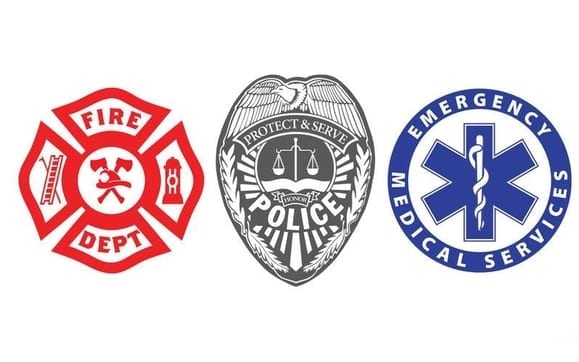First Responders Support for Stress
Common Signs and Signals of Stress
During the Incident:
Confusion, Nondirected activity, Disorientation, Tunnel vision, Crying, Tense muscles, clenched teeth, Profuse sweating, Chest pain, pounding heart
Immediate Post-Incident:
Blurred vision, Memory loss, Confusion, Nondirected activity, Disorientation, Restlessness
Delayed Post-Incident:
Restlessness, Irritability, Chronic fatigue, Sleep disturbances, Anxiety/depression, Moodiness, Muscle tremors, Trouble concentrating, Increased substance abuse, Nightmares, Headaches, Vomiting, Diarrhea, Suspiciousness
8 Ways for First Responders to Reduce Stress
(From California Casualty)
- Take time off when needed. Regardless of their role, first responders are an exceptional group of individuals committed to helping others and preserving safety. This dedication, while admirable, can quickly lead to a feeling of being overworked and highly stressed. After a particularly traumatic incident on the job, take time off to regroup and reinvest in yourself.
- Find a hobby. Essential for personal development, hobbies are a safe, healthy, and fun way to shift focus away from stressors and toward relaxation. From gardening or playing cards to painting or joining a club, participating in activities outside the workplace adds balance and serenity to your life.
- Exercise regularly. Keep up with the physical demands of your profession while maintaining a healthy weight by exercising regularly. Research indicates that exercise increases the body’s level of endorphins, resulting in improved mood, decreased irritability, and an enhanced ability to concentrate. Choose a fun fitness routine, like boxing or group classes, to remain motivated to exercise.
- Eat healthy foods. Expecting an uninterrupted lunch break as a first responder may seem far fetched, but that isn’t an excuse to load up on carbs, fat, sugar, and salt. In addition to negatively affecting your overall health, consuming unhealthy, processed, or fast foods can lead to increased irritability, low energy, and poor concentration. Instead, drink plenty of water and eat balanced meals that include whole grains, lean protein, and vegetables.
- Practice meditation or yoga. To battle the effects of stress, engage in meditation or stress-relieving exercises like yoga. By combining stretches, breathing exercises, and bodily poses, yoga helps relieve anxiety, depression, and stress. Meditation alone is shown to help alleviate feelings of anxiety and depression, as well as reduce pain. According to the National Center for Complementary and Alternative Medicine, meditation is a technique used by nearly 10% of adults in the U.S.
- Start a journal. Communicating your thoughts and feelings is crucial to overcoming the experience of trauma. Even if you’re not ready to speak with a counselor, keeping a journal about your experiences allows self-expression without threat of discrimination. Simply writing to yourself will not only help get certain events off your mind, but will also enhance your communication skills.
- Seek counseling. Individual counseling can work wonders for first responders, even if they have not recently experienced trauma. By actively participating in counseling, emergency professionals receive a source of ongoing emotional support while working to manage stress. Working with a therapist to establish and maintain a healthy lifestyle increases your ability to appropriately cope with stress.
- Attend a support group. Participation in social events in a supportive setting is crucial for first responders, as it helps form bonds between those recovering from work-related trauma. Meeting with others who have experienced similar events is both an affirming and reassuring activity. After joining support groups, first responders are able to expand their social networks, focus on healthy relationships, and overcome work-related trauma.
Asking for help is the hardest thing to do! Sometimes even “heroes” need help. Please reach out if you or someone you know is struggling.


